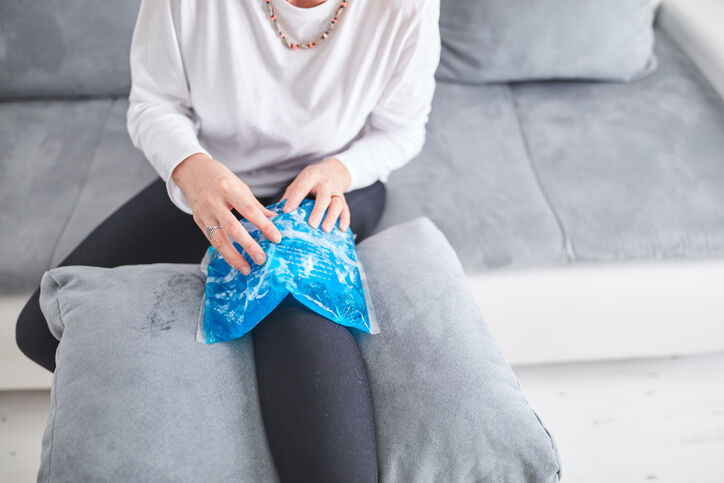
Can Ice Packs Help Varicose Veins?
We all know to use an ice pack to reduce swelling. Does the same concept apply to varicose veins?

Are you considering endovenous ablation to eliminate your varicose veins? Here’s what you can expect during and after the procedure.
Have you decided to treat your varicose veins? Great! You have plenty of options to relieve your leg pain, swelling, and cramping symptoms!
One such treatment is endovenous ablation, which involves using either the heat from a laser or radiofrequency waves to destroy the swollen vein. The FDA approved endovenous laser ablation in 1999 and laser ablation in 2002. Both methods are effective, safe, and don’t require much time. One study reviewed 657 patients who had undergone laser ablation therapy and found a 93 percent success rate. Here’s what you can expect during and after the procedure at home.
Endovenous ablation is non-surgical and minimally invasive. It’s performed as an outpatient procedure and typically completed within one hour.
Before the procedure, your vein specialist will review your health status and ask about any prescribed medications. You may be advised to stop some medications before the surgery.
You may receive a local anesthetic to make you more comfortable during the procedure. A numbing fluid is injected around the vein, as well. to help you relax.
After making a tiny incision below your knee or near your ankle, the vein specialist will insert a catheter into your vein. A thin instrument is then threaded through the catheter and into your vein. As the device moves through the vein, bursts of laser or radiofrequency heat close the veins.
Since no stitches are required, you’ll only need to wear a small Band-Aid after the procedure. The body will absorb the treated vein, so you should soon notice the vein becoming less noticeable. Blood will naturally divert to healthy nearby veins, restoring smooth blood circulation.
Although endovenous ablation is relatively new, it has been proven successful and safe. One study reviewed 657 patients who had undergone laser ablation therapy and found a 93 percent success rate. The procedure has replaced outdated vein treatments such as vein stripping and ligation, which required lengthy hospital stays and recovery periods.
Minimal bruising and slight pain are to be expected after the surgery. Over-the-counter pain medications can relieve those mild symptoms until they diminish in a few days.
While endovenous ablation is minimally invasive, you must take minor precautions afterward to ensure a complete recovery. Your vein specialist will discuss any restrictions. But in general, you can expect a short, successful recovery if you follow these do’s and don’ts:
Do have someone drive you home after the procedure.
Don’t participate in strenuous activities such as weightlifting or running for about a week. If you work at a job requiring heavy lifting, you might want to take a few days off.
Do low-impact exercises such as walking to promote circulation in the veins.
Don’t swim or take hot baths until your doctor says otherwise.
Do keep your incision dry and clean. Your vein specialist will instruct you on how and when to change the dressing.
Don’t fly for about two weeks.
Do prop up your leg on a pillow above your heart to reduce swelling.
Do wear compression stockings for a week after the procedure. The stockings provide gentle pressure on the vein to keep blood flowing.
Don’t forget to schedule a follow-up appointment with your vein specialist to check on your recovery.
Do report any unusual symptoms, such as fever, persistent pain and swelling, and signs of infections around the incision site.
Endovenous ablation offers more than symptom relief. It can also prevent potential complications from varicose veins, such as skin changes, venous ulcers, and even blood clots. Now that you know the benefits of endovenous ablation, don’t wait any longer to make an appointment with a board-certified vein specialist to get your veins treated.
Center for Vein Restoration (CVR) has two vein care centers in Austin, Texas. Both offer state-of-the-art techniques, such as endovenous ablation, to eliminate varicose veins.
Aditya Gupta, MD, RPVI, DABVLM, is the lead physician for both offices. He is an experienced vein physician with board certification in Internal Medicine and Venous and Lymphatic Medicine. Dr. Gupta draws on his years of experience and knowledge to develop a treatment plan tailored to your lifestyle and needs.
To schedule a consultation with Dr. Gupta or to speak with a representative, visit www.centerforvein.com.
Don't live near our Austin CVR locations? No problem! With over 100 vein clinic locations in 22 states and the District of Columbia, there's sure to be a CVR vein center near you.
11111 Research Boulevard
Suite 400
Austin, Texas 78759
7900 Farm to Market Road 1826
Building 1, Suite 170
Austin, TX 78737